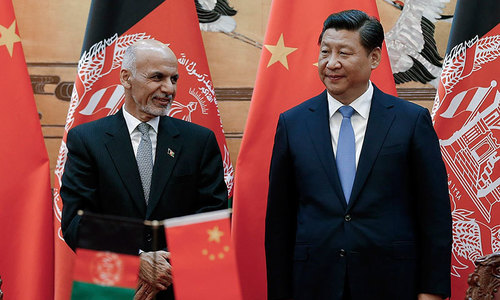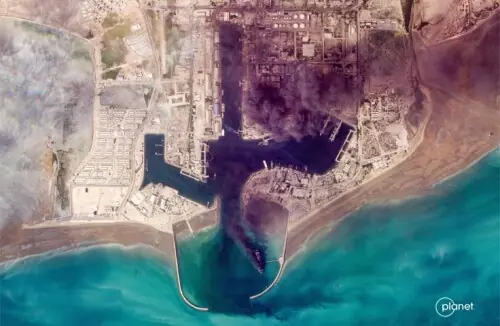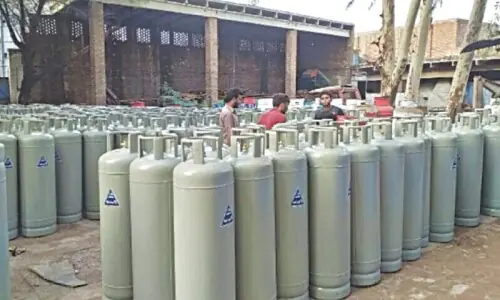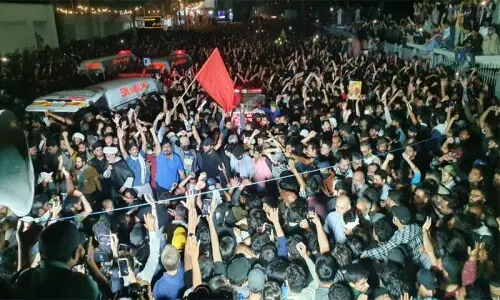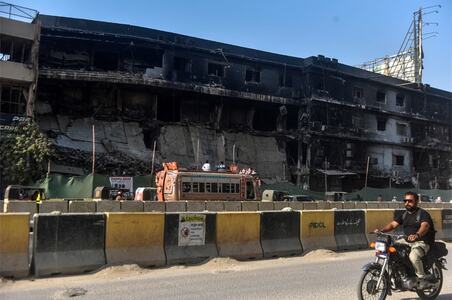WASHINGTON: Afghanistan cannot blame Pakistan for all its ills, as terrorist attacks happening there originate in that country, says Ambassador Aizaz Chaudhry, Islamabad’s envoy in Washington.
His Afghan counterpart Hamdullah Mohib argues that Afghanistan is not alone in blaming Pakistan; other neighbours, including Iran, also accuse it of interfering in their internal affairs. “Only the fish (of the Arabian Sea) do not because fish do not complain.”
The two ambassadors met on Monday afternoon in a dialogue on ‘Pakistan & Afghanistan relations, diplomacy & security challenges’, organised by a Washington-based think-tank, Indus, at Carnegie Endowment.
Chaudhry urges dialogue, revival of quadrilateral process and political solution
While Ambassador Chaudhry stressed the need for a dialogue, reviving the quadrilateral peace process and seeking a political solution to the Afghan conflict, Mr Mohib was not in a reconciliatory mood.
He not only accused Pakistan of stirring troubles in Afghanistan but also asked other nations, like China and the United States, not to give weapons to it. “One day, those weapons will be used against you,” he warned.
He was obviously emboldened by media reports that the Trump administration was ready to harden its approach toward Pakistan to crack down on militants who use their alleged hideouts in the Federally Administered Tribal Areas for launching attacks into Afghanistan.
Washington’s options
One report claimed that National Security Adviser Gen H.R. McMaster had told Pakistani officials that the US could attack targets inside Pakistan if American hostages held by the Afghan Haqqani militants were killed.
Reports in the US media claimed that the Trump administration was considering various options, which included expanding drone strikes, redirecting or withholding some aid and eventually downgrading Pakistan’s status as a major non-Nato ally.
But there are elements within the US administration that oppose taking such tough measures against Pakistan.
They argue that America’s close ties with India are already pushing Pakistan away and such harsh measures would further reduce Washington’s influence in Islamabad.
Whether motivated by these reports or other factors, the Afghan ambassador minced no words in attacking Pakistan in the dialogue.
“Military grade explosive were used in last month’s truck-bomb attack in Kabul” that killed more than 90 people, he said. “Those are not produced in ungoverned spaces of Afghanistan.”
Ambassador Mohib said that there were several “real issues” in working with Pakistan.
“We must work with Pakistan, yes. Which Pakistan? The one occupied by the military or the civil government?” he asked.
“Policies are made by the military. We are talking about today’s military that has a liberal mindset and uses extremism as tool for foreign policy. This new generation trained by Dawa institutes of Zia. We are seriously concerned about that generation.”
Ambassador Chaudhry began politely, expressing Pakistan’s desire to stay engaged with Afghanistan. “Time and history has shown that when Afghanistan was unstable, instability came to Pakistan as well,” he said.
“We have a genuine interest in a stable and prosperous Afghanistan.”
Mr Chaudhry said the Pakistani economy had stabilised and the country did not want to jeopardise that by seeking instability in Afghanistan.
He said that after the Tora Bora bombing in Afghanistan, militants came to the northern parts of Pakistan, but it had eliminated them from those areas at a huge cost, as 6,000 Pakistani soldiers had laid down their lives in those operations.
“Now peace has been restored and the economy is getting better. Investments are coming. These gains are at risk if Afghanistan does not become stable,” he said.
Kabul govt control
Ambassador Chaudhry pointed out that the government in Kabul did not have control over the entire country and militants were using those areas for carrying out their activities, such as the militant Islamic State (IS) group in Nangarhar, which was a matter of concern for Pakistan. “We are ready to contribute to peace in Afghanistan in whatever way possible,” he said.
“Glad to see the Pakistani economy picking up. So is the Afghan economy,” said Ambassador Mohib, but alleged that the global heroin trade was a third of the Pakistan economy and human trafficking and smuggling also contributed to it.
“We are at threat from these criminals who are threatening to take over,” he said. “No dialogue will succeed unless we are candid. We know what our objectives are. We don’t know what are Pakistan’s objectives.”
Mr Mohib said Afghan President Ashraf Ghani had “invested huge political capital” in ties with Pakistan but now he stated that Pakistan was engaged in an undeclared war.
“Nothing new, we have heard this mantra for the last few years,” Ambassador Chaudhry responded. “But we decided not to engage in blame game. It will not help any country.”
He told his Afghan counterpart that it’s “too simplistic to say Pakistan is responsible for all ills of Afghanistan,” and while doing so, the accusers ignored their own problems such as weak governance, corruption, drug trade and economic stress.
“Academically speaking, if the Pak-Afghan border is sealed completely, will it fix Afghanistan?” he asked. “We should show a friendly spirit, which was shown in Astana recently between President Ghani and PM Nawaz Sharif.”
He urged both countries to devise a mechanism to coordinate efforts to defeat terrorism.
Published in Dawn, June 21st, 2017





